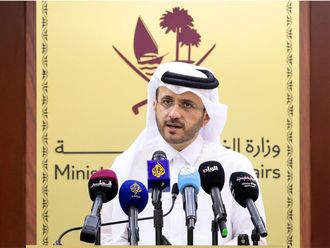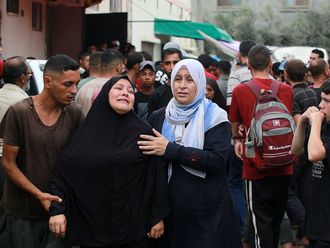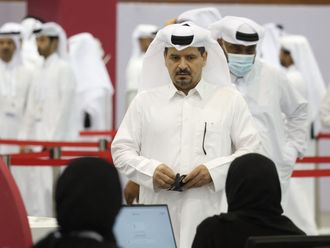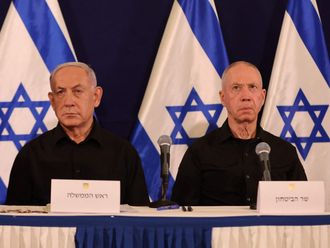WASHINGTON: Saudi Arabia and other Arab countries that have cut ties to Qatar issued a steep list of demands Thursday to end the crisis, insisting that their Gulf neighbour shutter Al-Jazeera, cut back diplomatic ties to Iran and sever all ties with the Muslim Brotherhood.
In a 13-point list — presented to the Qataris by Kuwait, which is helping mediate the crisis — the countries also demand an end to Turkey's military presence in Qatar.
The Associated Press obtained a copy of the list in Arabic from one of the countries involved in the dispute.
A look at the demands:
1. Curb diplomatic ties with Iran and close its diplomatic missions there. Expel members of Iran's Revolutionary Guard from Qatar and cut off any joint military cooperation with Iran. Only trade and commerce with Iran that complies with US and international sanctions will be permitted.
2. Sever all ties to "terrorist organisations," specifically the Muslim Brotherhood, the Daesh militant group, Al Qaida, and Lebanon's Hezbollah. Formally declare those entities as terrorist groups.
3. Shut down Al Jazeera and its affiliate stations.
4. Shut down news outlets that Qatar funds, directly and indirectly, including Arabi21, Rassd, Al Araby Al Jadeed and Middle East Eye.
5. Immediately terminate the Turkish military presence currently in Qatar and end any joint military cooperation with Turkey inside of Qatar.
6. Stop all means of funding for individuals, groups or organizations that have been designated as terrorists by Saudi Arabia, the UAE, Egypt, Bahrain, the United States and other countries.
7. Hand over "terrorist figures" and wanted individuals from Saudi Arabia, the UAE, Egypt and Bahrain to their countries of origin. Freeze their assets, and provide any desired information about their residency, movements and finances.
8. End interference in sovereign countries' internal affairs. Stop granting citizenship to wanted nationals from Saudi Arabia, the UAE, Egypt and Bahrain. Revoke Qatari citizenship for existing nationals where such citizenship violates those countries' laws.
9. Stop all contacts with the political opposition in Saudi Arabia, the UAE, Egypt and Bahrain. Hand over all files detailing Qatar's prior contacts with and support for those opposition groups.
10. Pay reparations and compensation for loss of life and other, financial losses caused by Qatar's policies in recent years. The sum will be determined in coordination with Qatar.
11. Align itself with the other Gulf and Arab countries militarily, politically, socially and economically, as well as on economic matters, in line with an agreement reached with Saudi Arabia in 2014.
12. Agree to all the demands within 10 days of it being submitted to Qatar, or the list becomes invalid. The document doesn't specify what the countries will do if Qatar refuses to comply.
13. Consent to monthly audits for the first year after agreeing to the demands, then once per quarter during the second year. For the following 10 years, Qatar would be monitored annually for compliance.
Saudi Arabia, Egypt, the United Arab Emirates and Bahrain broke ties with Qatar this month over allegations the Gulf country funds terrorism — an accusation that President Donald Trump has echoed.
Those countries have now given Qatar 10 days to comply with all of the demands, which include paying an unspecified sum in compensation.
Qatari officials in Doha did not immediately respond to a request for comment from the AP.
The demands were also likely to elicit Qatari objections that its neighbours are trying to dictate its sovereign affairs by imposing such far-reaching requirements.
Only a day earlier, Secretary of State Rex Tillerson had warned the demands must be "reasonable and actionable."
The US issued that litmus test amid frustration at how long it was taking Saudi Arabia and others to formalize a list of demands, complicating US efforts to bring about a resolution to the worst Gulf diplomatic crisis in years.
According to the list, Qatar must refuse to naturalize citizens from the four countries and expel those currently in Qatar, in what the countries describe as an effort to keep Qatar from meddling in their internal affairs.
They are also demanding that Qatar hand over all individuals who are wanted by those four countries for terrorism" stop funding any extremist entities that are designated as terrorist groups by the US" and provide detailed information about opposition figures that Qatar has funded, ostensibly in Saudi Arabia and the other nations.
Qatar vehemently denies funding or supporting extremism.
But the country acknowledges that it allows members of some extremist groups such as Hamas to reside in Qatar, arguing that fostering dialogue with those groups is key to resolving global conflicts.
Qatar’s neighbours have also accused it of backing Al-Qaida and the Daesh group's ideology throughout the Middle East.
Those umbrella groups also appear on the list of entities whose ties with Qatar must be extinguished, along with Lebanon's Hezbollah and the Al-Qaida branch in Syria, once known as the Nusra Front.
More broadly, the list demands that Qatar align itself politically, economically and otherwise with the Gulf Cooperation Council, a regional club that has focused on countering the influence of Iran.
Saudi Arabia and other nations have accused Qatar of inappropriately close ties to Iran, Saudi Arabia's regional foe.
The Iran provisions in the document say Qatar must shut down diplomatic posts in Iran, kick out from Qatar any members of Iran's elite Revolutionary Guard, and only conduct trade and commerce with Iran that complies with US sanctions.
Under the 2015 nuclear deal, nuclear-related sanctions on Iran were eased but other sanctions remain in place.
Cutting ties to Iran would prove incredibly difficult.
Qatar shares a massive offshore natural gas field with Iran which supplies the small nation that will host the 2022 FIFA World Cup its wealth.
Not only must Qatar shut down the Doha-based satellite broadcaster, the list says, but also all of its affiliates. That presumably would mean Qatar would have to close down Al-Jazeera's English-language sister network.
Supported by Qatar's government, Al-Jazeera is one of the most widely watched Arabic channels, but it has long drawn the ire of Mideast governments for airing alternative viewpoints.
The network's critics say it advances Qatar's goals by promoting movements like the Muslim Brotherhood.
The list also demands that Qatar stop funding a host of other news outlets including Arabi21 and Middle East Eye.
If Qatar agrees to comply, the list asserts that it will be audited once a month for the first year, and then once per quarter in the second year after it takes effect.
For the following 10 years, Qatar would be monitored annually for compliance.












